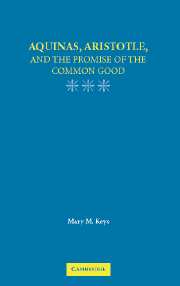Book contents
- Frontmatter
- Contents
- Acknowledgments
- PART I VIRTUE, LAW, AND THE PROBLEM OF THE COMMON GOOD
- PART II AQUINAS'S SOCIAL AND CIVIC FOUNDATIONS
- 3 Unearthing and Appropriating Aristotle's Foundations: From Three Anglo-American Theorists Back to Thomas Aquinas
- 4 Reinforcing the Foundations: Aquinas on the Problem of Political Virtue and Regime-Centered Political Science
- 5 Finishing the Foundations and Beginning to Build: Aquinas on Human Action and Excellence as Social, Civic, and Religious
- PART III MORAL VIRTUES AT THE NEXUS OF PERSONAL AND COMMON GOODS
- PART IV POLITICS, HUMAN LAW, AND TRANSPOLITICAL VIRTUE
- Works Cited
- Index
3 - Unearthing and Appropriating Aristotle's Foundations: From Three Anglo-American Theorists Back to Thomas Aquinas
Published online by Cambridge University Press: 25 July 2009
- Frontmatter
- Contents
- Acknowledgments
- PART I VIRTUE, LAW, AND THE PROBLEM OF THE COMMON GOOD
- PART II AQUINAS'S SOCIAL AND CIVIC FOUNDATIONS
- 3 Unearthing and Appropriating Aristotle's Foundations: From Three Anglo-American Theorists Back to Thomas Aquinas
- 4 Reinforcing the Foundations: Aquinas on the Problem of Political Virtue and Regime-Centered Political Science
- 5 Finishing the Foundations and Beginning to Build: Aquinas on Human Action and Excellence as Social, Civic, and Religious
- PART III MORAL VIRTUES AT THE NEXUS OF PERSONAL AND COMMON GOODS
- PART IV POLITICS, HUMAN LAW, AND TRANSPOLITICAL VIRTUE
- Works Cited
- Index
Summary
Aristotelianism and Political-Philosophic Foundations, Old and New
In this chapter I begin to investigate Aquinas's social and civic foundations, probing their philosophic origins in Aristotle's texts. As several statements in On Kingship and especially in the ST make clear, Aquinas understands politics to be rooted in our common human nature, which in turn encompasses an inherent rational inclination toward participation in the common good of a just and beneficial social order. It is easy to see in this position shades of Aristotle's position in the Politics, “that the city belongs among the things that exist by nature, and that man is by nature a political animal” (Pol. I.2, 1253a2–4). To probe more deeply the meaning and resonance of this Aristotelian foundation for Aquinas's theories of virtue, law, and the common good, we need to return to the relevant passages of Aquinas's Commentary on the “Politics” of Aristotle, too often neglected in studies of Aquinas's thought. There we learn how Aquinas interprets the anthropological and ethical arguments with which the Politics commences and that appear to ground Aquinas's theory of political life and the common good. For Aquinas, I will argue, political community is natural to human beings in a real yet relative and qualified way. The analogy Aquinas draws between this social and civic naturalness, and the naturalness to human beings of moral virtue, is critical for apprehending the purposes as well as the problematic of politics as Aquinas sees them.
- Type
- Chapter
- Information
- Aquinas, Aristotle, and the Promise of the Common Good , pp. 59 - 86Publisher: Cambridge University PressPrint publication year: 2006



